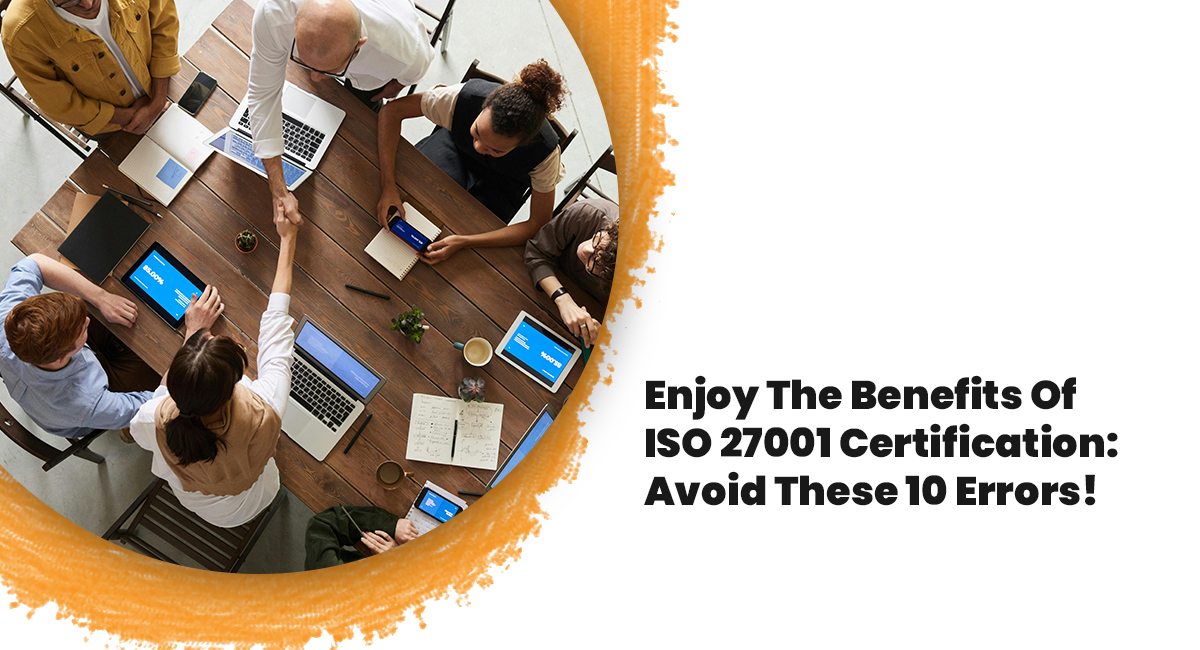With a cyber attack happening every 39 seconds on average, information security is no longer an afterthought. It’s a necessity.
Consequently, information security standards and regulations, such as ISO 27001, have become the cornerstone of building a resilient and thriving information security management system. In fact, many companies these days demand their partners to provide an information security certification to protect their operations from cyber attacks.
That said, the ISO 27001 certification benefits go beyond healthy partnerships. It can help you protect the most critical assets of your organization and avoid legal issues related to cyber crimes.
However, obtaining the ISO 27001 certification is not a walk in the park. It’s a lengthy, detailed, and demanding process that requires continuous maintenance. As a result, mistakes happen. Moreover, if you don’t take appropriate action to address those blunders, you might lose the certification.
Through today’s blog, we are here to give you an advance alert so you don’t make the same errors as others when pursuing the ISO 27001 certification.
So, let’s get started!
Terrifying Mistakes That Can Prevent You From Enjoying The ISO 27001 Certification Benefits
1.Neglecting Top Management Involvement
Top management has critical responsibilities in developing, implementing, analyzing, and maintaining ISO 27001 certification. Their commitment, support, and role in communicating the ISO 27001 certification benefits are critical for the organization-wide success of the system.
It’s nearly impossible to comply with the ISO 27001 requirements without dedication from top management. It can lead to poor resource management, direction, authority, and ineffective implementation.
2.Overcomplicated Policies
Another grave error organizations make when pursuing ISO 27001 certification is creating complex and convoluted policies. If your ISMS policies are not comprehensible to auditors or staff, you can’t expect them to follow the rules.
Overcomplicated policies also lead to confusion, misinterpretations, misdiagnosis of security issues, and, eventually, non-compliance.
Hence, keep your ISO 27001 policies straightforward, jargon-free, and accessible to relevant parties.
3.Failing To Align Business Objectives With ISO 27001 Policies
To truly enjoy the countless ISO 27001 certification benefits, you must align the organization’s overall objectives with the ISMS policies. Failing to establish this alignment will create a disconnection between your company’s aims and priorities.
Hence, when developing the ISO 27001 policies, involve key stakeholders and utilize the policies to address business risks, objectives, and compliance requirements.
4.Neglecting the Risk Assessment
The significance of risk assessments in ISO 27001 cannot be emphasized enough. It’s the best way for you to detect the risks threatening your ISMS and address them swiftly.
Yet, many organizations neglect their risk assessment performance, leading to overlooked threats, impacts, and inefficient controls.
If you don’t want to make the same error, regularly review and update your organization’s risk assessment process.
5.Not Reviewing The Policies
A prominent ISO 27001 certification benefit is that it mandates the periodic review of policies, procedures, and processes. It encourages organizations to keep their priorities in check and constantly make improvements to their system.
The routine reviews also aid with staying relevant and compliant with applicable regulations.
However, when you neglect to review and update the ISMS policies, it appears as a red flag to third-party auditors. It can lead to major non-conformations and even legal issues.
6.Inadequate Incident Response Planning
An adequate incident response plan is critical for minimizing the impact of potential security incidents and ensuring timely response.
Still, many organizations make the mistake of poorly developing their incident response plans.
As a result, they struggle to detect, respond to, and receive security issues. Instead of repeating the same mistake, ISO 27001 experts suggest periodically testing the incident plans and improving its effectiveness.
7.Failure To Monitor And Measure The ISMS Processes And Compliance
Monitoring and measuring is one of the most significant clauses you have to meet to enjoy the ISO 27001 certification benefits. ISO 27001 requires establishing a proper process for measuring and monitoring the ISMS policies and procedures.
Naturally, if you fail to satisfy this requirement, it will become a major nonconformity.
Also, you will miss out on the gaps and flaws of your system, leading to inaccurate outcomes.
8.Ignoring Third-Party Risks
Do you know 95% of data breaches are a result of human error? Many of these incidents are caused by third-party vendors or partners.
ISO 27001 requirements specifically ask organizations to carry out third-party risk management and conduct due diligence before establishing relationships.
Failing to comply will prevent you from obtaining the ISO 27001 certification.
9.Lack Of Continual Improvement Evidence
ISO standards encourage organizations to embrace a culture of continual improvement to stay compliant and relevant.
Unfortunately, organizations often see policy executions as a one-time job. They don’t put much effort into improving the policies and recording the improvement actions. To auditors, this appears as a sign of a lack of commitment.
Hence, if you want to obtain the ISO 27001 certification seamlessly, regularly review your policies, seek feedback, and identify gaps and opportunities for improvement.
10.Noncompliance With Legal And Regulatory Requirements
When you implement the requirements of ISO 27001, you not only commit to following its 10 clauses but all the legal and regulatory requirements that apply to your organization. It may include the data protection laws of your country and contractual obligations in your industry. Not complying with these laws can lead to major nonconformities.
Concluding Thoughts
Committing any of these mistakes can cost you the ISMS certification and prevent you from enjoying the ISO 27001 certification benefits. So, take notes and ensure to involve your top management in the process, create straightforward policies, and comply with each clause of the standard carefully.




